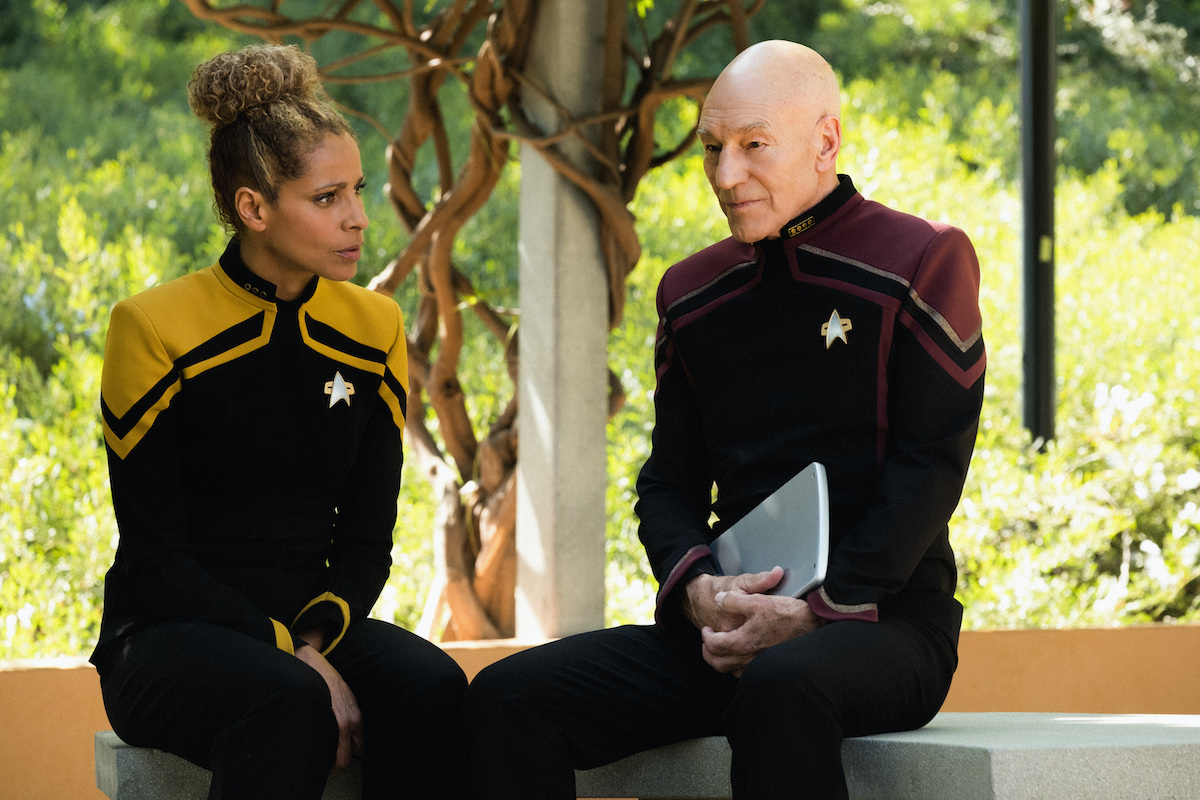“You are Starfleet. To the core.”
Patrick Stewart does a better job of convincing me of the emotional contours of Picard’s departure from Starfleet in this episode; in the prologue flashback, we see him emerging from the immediately-post-Mars, let’s-still-save-Romulus meeting, having staked his career on their saying yes — and Starfleet having called his bluff and taken his resignation instead. Last week I opined that Stewart doesn’t like Starfleet, but at least here, Picard himself seems to like them, and he feels genuinely at a loss for what to do with their decision — at a loss, in fact, to even process the fact that they called him on it in the first place. This means that the after-the-fact packaging of his “resignation” in the premiere might be a literal truth but an emotional lie. From Picard’s point of view, he’s the one who was left.
Now, the backstory of Raffi’s beef with Picard is harder to wrap my head around. Picard resigned, and for some reason Starfleet fired her immediately afterwards, and she blames him. Starfleet’s logic doesn’t track, and neither does hers. This is plot expedience, nothing more, and it starts Raffi out on a weak note from which the character struggles to recover. Throw in the addiction thing, and a depressed Captain Rios with PTSD, and — oh right — this is the one where Agnes gets weaponized by Commodore Oh, and I’m reminded that pretty much everyone in this season is miserable.
I suppose it’s plausible that addiction, as an illness, could be “solved” for in the 24th century while still allowing that the person suffering from it would still need to choose to seek help. Raffi sitting alone in the desert nursing a grudge and a drug habit for 14 years because she lost her Starfleet security clearance feels contrived, though. I don’t like the idea that Picard never checked in on her; I suppose such things happen, and he does look aghast when she calls him on it and apologizes immediately, but even for a show that is (currently) going out of its way to put some distance between Picard and any of his old friends, this, too, feels contrived.
Now, gang full of broken people putting each other back together is such a staple of modern fan content that it scarcely bears wondering why the show would go this route, but it still contributes to the overall sense that Picard season 1 is aggressively dour, and not very Star Trek-ish. The set design for the season’s starship, La Sirena, of which I did eventually grow fond, doesn’t help: it’s a cold, dark cavern, like spending the season in an unfinished basement, and it feels light-years away from the community centre warmth of the Enterprise-D.
Speaking of old friends: I cannot imagine there was a single Next Gen fan who would have predicted that the first major canon guest star on this series was going to be Hugh Borg, but here we are. Jonathan Del Arco doesn’t get much to do besides dispense information, but he makes narrative sense as the Artifact’s director. The Zhat Vash / Soji plotline continues to gallop forward at warp speed; Romulan Fuckboi is already professing love to her, Romulan Fuckboi’s sister is already on the cube making incest-eyes at Romulan Fuckboi, and the last Romulan to be assimilated by this cube before it went dormant is calling Soji “Seb-Cheneb.” Meanwhile, back on Earth, the gang full of broken people has a ship and they finally set off to parts unknown — and Patrick Stewart only looks marginally ruffled when made to say “Engage.”
Blogging the Next Generation: Picard runs Thursdays on tederick.com as I work my way through every episode of Star Trek: Picard. The original BTNG did the same for Star Trek: The Next Generation.
